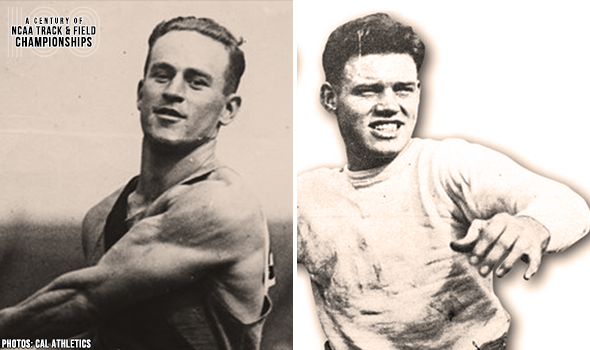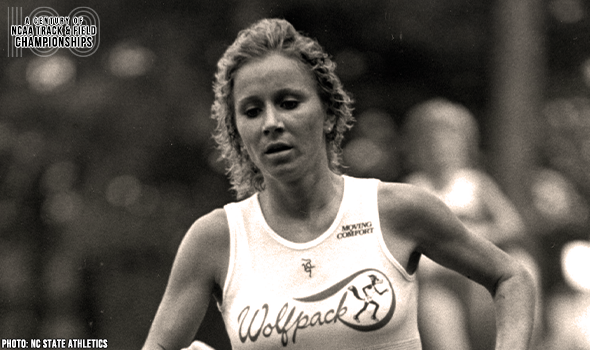
Hall Equaled 120H World Record In 1969
Erv Hall of Villanova started the excitement early at the 1969 NCAA Division I Outdoor Track & Field Championships.
In the first heat of the first track event of the first day, Hall equaled a world record of 13.2 in the 120-yard hurdles.
The record time caught everyone by surprise – including Hall.
As Tom Cushman of the Philadelphia Daily News reported, “Hall slumped onto a nearby bench, grinning broadly, shaking his head in disbelief. ‘It felt good. . . I thought it was fairly fast. . . but I can’t believe 13.2,’ he said. ‘Things like this can happen at the strangest times’.”
Hall came back the next day to win both his semifinal and the final in 13.3 – faster than the previous meet record of 13.4 that he had a share of from when he finished second at the 1968 NCAA meet.
Some observers believe credit for Hall’s fast times were due to the surface at Tennessee’s Tom Black Track, as the host site was sporting the same Tartan surface that was used the previous year at the Olympics in Mexico City.
Hall might have been more familiar with the surface than others – indeed, he was a silver medalist in the 1968 Olympics. Still, it was the same surface for everyone, and Hall won all three of his rounds in the 1969 NCAA meet by at least 0.2 seconds.
The NCAA and collegiate track & field will mark a momentous milestone in the spring of 2021 -- the 100th anniversary of the NCAA Championships and with that, the NCAA Track & Field Championships. In June 1921, the University of Chicago hosted the first track & field championships in NCAA history.
This point can’t be emphasized enough: Not only was the event the first for NCAA track & field, but the first championships for any sport under the sponsorship of the NCAA.
To celebrate, over each of the next 365 days, the U.S. Track & Field and Cross Country Coaches Association (USTFCCCA) will celebrate moments, student-athletes, and coaches that have made a century’s worth of championships special. From humble beginnings to important historical milestones to the modern-day, collegiate track & field has evolved with the American society.
The 2021 edition of the NCAA Division I Outdoor Track & Field Championships begin with preliminary round action on May 27-29 in Jacksonville, Fla., and College Station, Texas. The championships final site and culmination of the celebration is slated for June 9-12, 2021 at the newly rebuilt Hayward Field in Eugene, Ore.

Merchant, Muller Led Cal’s Field Day In 1922
Jack Merchant and Harold Muller combined for six top-5 finishes in five field events at the 1922 NCAA Outdoor Track & Field Championships.

NC State’s Springs Doubles Up Distance Titles
In 1983, Betty Springs became the first woman in the history of the NCAA Division I Outdoor Track & Field Championships to sweep the 5K/10K titles.

“Marvelous Mal” Whitfield Stars Over Two Laps
“Marvelous” Mal Whitfield won back-to-back NCAA 800-meter/880-yard titles in 1948 and 1949.

Ewen Was A True Triple Threat At NCAAs
Maggie Ewen is the only woman in the history of the NCAA Division I Outdoor Track & Field Championships with titles in three different throwing events.

Wanamaker Wins Inaugural Decathlon Title
Rick Wanamaker of Drake won the first-ever decathlon title at the NCAA Division I Outdoor Track & Field Championships in 1970!

SMU’s Connor Bounds To Triple Jump Greatness
It’s been 38 years and still no one has broken the meet record Keith Connor of SMU set in the triple jump at the 1982 NCAA Division I Outdoor Track & Field Championships in Provo, Utah.

Hail Lorenzo! Daniel Sprints To 200-Meter Records
Lorenzo Daniel of Mississippi State made four consecutive appearances in the final of the Men’s 200 Meters and set a collegiate and meet record in his last race.

Talented Twins Dominate Pole Vault Podium
Twin sisters Lexi Jacobus and Tori Hoggard finished on the same podium five times in eight seasons at the NCAA Championships and each won an outdoor title.

Blozis Was A “Giant” In The Shot
“Giant” Al Blozis won three consecutive shot put titles at the NCAA Outdoor Championships between 1940 and 1942.

Cameron Came Close To Standing Alone
Two one-hundredths of a second separated Bert Cameron of UTEP from standing alone in NCAA history.

